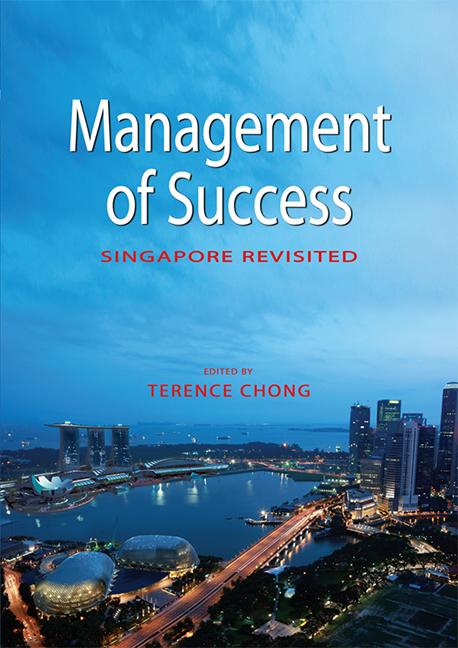Book contents
- Frontmatter
- Contents
- List of Tables and Figures
- Foreword
- Message
- Quote
- Preface
- The Contributors
- 1 Introduction: The Role of Success in Singapore's National Identity
- SECTION 1 SINGAPORE IN THE BIGGER PICTURE
- SECTION 2 LEADERSHIP, POLICY AND POLITICS
- SECTION 3 THE RESTRUCTURING OF THE ECONOMY
- SECTION 4 THE TRANSFORMATION OF SOCIETY
- SECTION 5 THE LAW
- SECTION 6 MODIFICATION OF THE ENVIRONMENT
- SECTION 7 COMMUNITY AND NATIONAL SECURITY
- SECTION 8 LIFE IN SINGAPORE
- 26 Culture, the Arts and the Global City
- 27 Fluid Nation: The Perpetual “Renovation” of Nation and National Identities in Singapore
- 28 Suffer the Rebellious Children: The Politics of Remaking Singapore and the Remaking of Singapore Politics
- 29 “It's Like Rice on the Table, It's Our Common Dish”: The English Language and Identity in Singapore
- 30 Multiculturalism and the Problem of Solidarity
- 31 Sexual Governance and the Politics of Sex in Singapore
- 32 Conclusion
- Index
30 - Multiculturalism and the Problem of Solidarity
from SECTION 8 - LIFE IN SINGAPORE
Published online by Cambridge University Press: 21 October 2015
- Frontmatter
- Contents
- List of Tables and Figures
- Foreword
- Message
- Quote
- Preface
- The Contributors
- 1 Introduction: The Role of Success in Singapore's National Identity
- SECTION 1 SINGAPORE IN THE BIGGER PICTURE
- SECTION 2 LEADERSHIP, POLICY AND POLITICS
- SECTION 3 THE RESTRUCTURING OF THE ECONOMY
- SECTION 4 THE TRANSFORMATION OF SOCIETY
- SECTION 5 THE LAW
- SECTION 6 MODIFICATION OF THE ENVIRONMENT
- SECTION 7 COMMUNITY AND NATIONAL SECURITY
- SECTION 8 LIFE IN SINGAPORE
- 26 Culture, the Arts and the Global City
- 27 Fluid Nation: The Perpetual “Renovation” of Nation and National Identities in Singapore
- 28 Suffer the Rebellious Children: The Politics of Remaking Singapore and the Remaking of Singapore Politics
- 29 “It's Like Rice on the Table, It's Our Common Dish”: The English Language and Identity in Singapore
- 30 Multiculturalism and the Problem of Solidarity
- 31 Sexual Governance and the Politics of Sex in Singapore
- 32 Conclusion
- Index
Summary
We have evolved, not by design, but by choice, a certain ease by which we adopt and modify cultural traits and values from each other. At the same time through the years of nation-building and shared experiences we begin to adopt orientations, aspirations and values that are shared by all Singaporeans. Hence all Singaporeans, irrespective of race or creed, would demand efficient government services and would cringe at inefficiencies that we come across elsewhere. We have become both a melting pot and a mosaic.
THE PROBLEM OF SOLIDARITY
The occasion for the speech of then Minister for Community Development and Sports Yaacob Ibrahim was at the Wee Kim Wee Seminar on Cross-Cultural Understanding held at the Singapore Management University, on 2 August 2003. It is a landmark speech for many reasons. First and foremost, the speech signifies a shift in the government's keystone multiracialism policy. The Minister describes the development of multiracialism as proceeding from the melting pot approach of the early years to the mosaic approach in the second phase, and called the next phase “multiculturalism”, an approach that combines both the melting pot and mosaic approaches. A new Singaporean identity forged out of local ethnic identities is imagined in the speech: neither the amalgamated nor the hyphenated Singaporean of the two earlier phases, but a cosmopolitan Singaporean able to move comfortably between diverse ethnic cultures. Significantly, the speech was made in the midst of a flurry of institutional innovations that saw the setting up of facilitating organizations with the mandate to build networks between existing grassroots organizations.
It is well known that the long-running, successive People's Action Party (PAP) governments have a strong continuity of pragmatism in their policy approach that has, for all purposes, entrenched itself as a vaunted tradition in public life. The three phases of multiracialism have evolved, as Yaacob Ibrahim puts it, “not by design, but by choice”. The primary concern in all three phases is the problem of solidarity, which underlies the constant reiterations of the need for racial harmony and for the programme of nation-building. Policy variation through the three phases is a result of the PAP leadership's interpretation of the way the changing social context affects, disrupts, or obstructs the solidarity of Singaporeans, especially with regard to the national project of development.
For over forty years, the solidarity of the nation, fortified by multiracialism, has been apparent.
- Type
- Chapter
- Information
- Management of SuccessSingapore Revisited, pp. 561 - 578Publisher: ISEAS–Yusof Ishak InstitutePrint publication year: 2010



